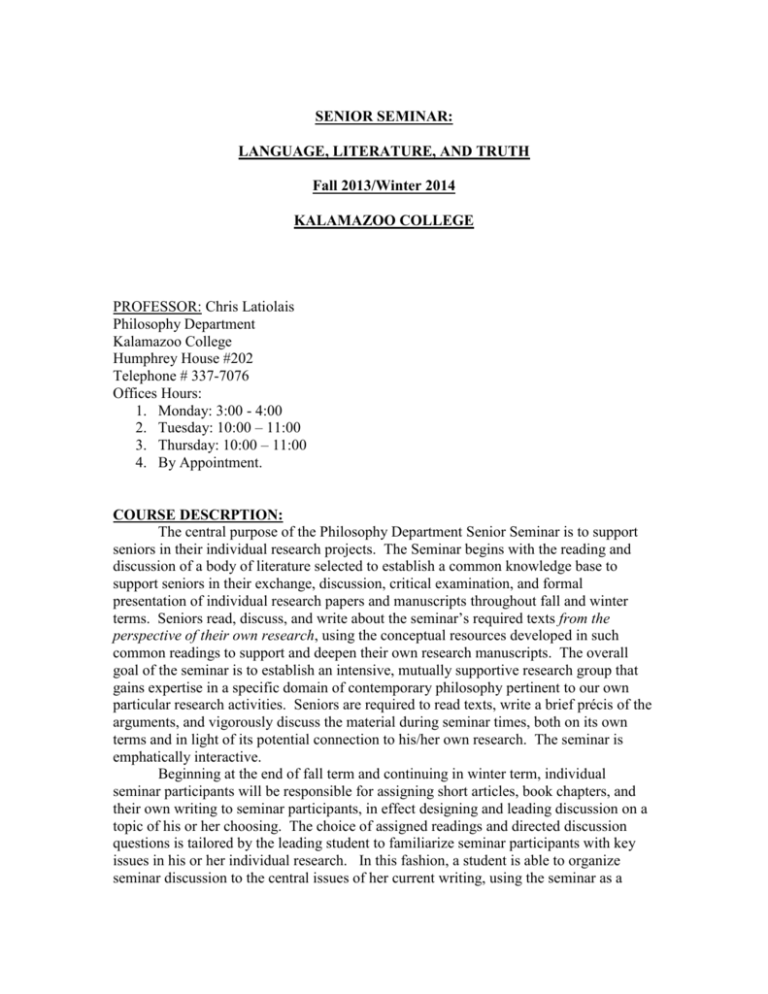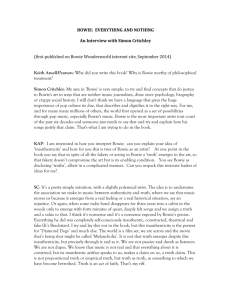PHIL 490: Senior Seminar
advertisement

SENIOR SEMINAR: LANGUAGE, LITERATURE, AND TRUTH Fall 2013/Winter 2014 KALAMAZOO COLLEGE PROFESSOR: Chris Latiolais Philosophy Department Kalamazoo College Humphrey House #202 Telephone # 337-7076 Offices Hours: 1. Monday: 3:00 - 4:00 2. Tuesday: 10:00 – 11:00 3. Thursday: 10:00 – 11:00 4. By Appointment. COURSE DESCRPTION: The central purpose of the Philosophy Department Senior Seminar is to support seniors in their individual research projects. The Seminar begins with the reading and discussion of a body of literature selected to establish a common knowledge base to support seniors in their exchange, discussion, critical examination, and formal presentation of individual research papers and manuscripts throughout fall and winter terms. Seniors read, discuss, and write about the seminar’s required texts from the perspective of their own research, using the conceptual resources developed in such common readings to support and deepen their own research manuscripts. The overall goal of the seminar is to establish an intensive, mutually supportive research group that gains expertise in a specific domain of contemporary philosophy pertinent to our own particular research activities. Seniors are required to read texts, write a brief précis of the arguments, and vigorously discuss the material during seminar times, both on its own terms and in light of its potential connection to his/her own research. The seminar is emphatically interactive. Beginning at the end of fall term and continuing in winter term, individual seminar participants will be responsible for assigning short articles, book chapters, and their own writing to seminar participants, in effect designing and leading discussion on a topic of his or her choosing. The choice of assigned readings and directed discussion questions is tailored by the leading student to familiarize seminar participants with key issues in his or her individual research. In this fashion, a student is able to organize seminar discussion to the central issues of her current writing, using the seminar as a workshop focused exclusively upon such work. The work of the leading student and seminar participants will be graded on the quality of their cooperative work. We will assign specific weeks to individual students during our first meeting of the year. The broad themes of this year’s seminar are given in the title: language, literature, and truth. However, our primary text – Andrew Bowie’s From Romanticism to Critical Theory: The Philosophy of Recent Literary Criticism – appears quite restrictive, dealing with German Romanticism as a critical reception of Kant’s transcendental idealism. The choice of this text, alongside our “primer” in the philosophy of language – Jose Medina’s Language: Key Concepts in Philosophy – requires some justification. Obviously the themes of language and truth, on the one hand, and literature and truth, on the other, are expansive, covering vast areas of scholarship. Indeed, the question of truth in connection with linguistic meaning is the core issue of Anglo-American philosophy of language, with its insistent pursuit of a semantic theory of meaning. Moreover, the question of the meaning and purported truth of literary artworks is arguably a central concern of French post-structuralist theorists such as Foucault, Derrida, De Man, Kristeva, Lyotard, and others, who seem to embrace a form of radical pragmatic contextualism appropriately deemed “meaning eliminativism.” This polar opposition between a confident semantics of natural language, at one extreme, and an equally confident meaning skepticism generated by Neo-structuralist analysis of literature, at the other, presents special problems for structuring a reasonably paced, ten-week course devoted to the topics. It’s precisely this apparent impasse between Anglo-American truth semantics of language on the one hand, and Francophone structuralist analysis of literature, on the other, that is mediated in Bowie’s From Romanticism to Critical Theory: The Philosophy of German Literary Theory. According to Bowie, the core insights of Francophone literary criticism – hyperbole, animosity, and histrionics aside – are to be understood as historical variants of German romantic insights into aesthetic judgment and the aesthetic dimensions of ordinary language. The “aesthetic” dimension of language arises in connection with the interpretation of literary tropes – e.g. metaphor, analogy, simile, etc. – and literary narratives. The “interpretive” dimension of language arises in connection with understanding the role of context or background in the determination of literal utterance meaning. It’s precisely these “aesthetic” and “interpretive” dimensions of natural language that became the central focus of post-analytic philosophers of language such as Quine, Davidson, Kripke, Putnam, Rorty, and Brandom. To oversimplify a complex story, the German romantic concern with the relationship between determinate and reflective judgments – between “theoretical” and “aesthetic” experience – parallels, in significant ways, the concern on the part of post-analytic philosophers with the (determinate) rule-governed semantic and (indeterminate) context-dependent pragmatic interpretation of linguistic constructions. Simply put, the (widely understood) “interpretive” or “hermeneutic” dimension of language embraces a play between determinate and indeterminate dimensions of language, and while this play is showcased in literary language use, it’s also an ineluctably present in language use as such, whether everyday or scientific. It’s precisely this hermeneutic dimension of language use that allows us to better appreciate the overlaps and commonalities between “analytic” and “continental” traditions of philosophy. While the central target of Bowie’s book is the reductionist strategies of contemporary “culture-studies” approaches to literary interpretation, which treat literary texts as ideological tools of power elites, we will continue to examine basic issues in the philosophy of language. More specifically, we will examine the so-called “direct reference revolution” – arguably the most important development of 20th-century philosophy of language – as well as both discourse analysis and the role of language in identity formation. These three issues – reference, social context, and identity – are, I will argue, best understood from a radicalized hermeneutic perspective capable of appreciating the intricate interplay between determinate and indeterminate dimensions of language use. Perhaps our key “text case” or “case study” in this regard will be de se or self-reference: what resources does language put into play when a speaking agent refers to herself? How is agency enabled or dis-enable by language? One of the central questions in contemporary philosophy is whether agency is the condition of language or, in contrast, language the condition agency. How one answers this question defines, to a great extent, one’s very conception of what it is to do contemporary philosophy. Philosophy in the late 20th Century divides, roughly, into two camps: hermeneutic and neo-structuralist. Hermeneutic philosophers maintain the distinctive role of the speaking subject as the (potentially) conscious subject of meaning and truth – the subject understands, interprets, and therein transforms linguistic practices. In contrast, neo-structuralist philosophers maintain the view that the subject is the effect, the “play,” or the epiphenomenon of language as a system of structural differences: the subject comes into being as a mere nodal point in the circulation and exchange of anonymous signs or signifiers. Daniel Dennett has popularized this view of language “speaking us” or “through us” in his widely discussed accounts of memes and mind. The vaunted modernism/postmodernism debate is often reduced to just this polar opposition. Do we speak language or does language “speak us”? Are we active agents or passive sufferers within language? The famous French neo-structuralists of the 20th Century – e.g. Lacan, Foucault, Derrida, Lyotard, Bourdieu, and Butler –champion a post-modern turn that decries the pretensions of agency and autonomy vis-à-vis language. Neostructuralists are committed to the thesis that the self is radically, fundamentally, and irreversibly decentered or “split” by language. In contrast, the German hermeneutic philosophers – i.e. early Heidegger, Gadamer, Habermas, Wellmer, Seel, and Honneth – continue to offer accounts of the complex relation between speaker and language that refuse to reduce the former to an effect of the latter. Hermeneutic philosophers are committed to the thesis that the self is capable of grasping linguistic meaning, on the one hand, and its own involvement in the ongoing social alteration of meaning, on the other, as a circular, dialogical, historical process. In this sense, speakers are both products and yet initiators of language, both “decentered” by language and centered within it. REQUIRED TEXTS: 1) Bowie, Andrew. From Romanticism to Critical Theory: The Philosophy of German Literary Theory. New York, NY: Routledge, 1997. 2) Medina, Jose. Language: Key Concepts in Philosophy. London, England: Continuum Press, 2005. RECOMMENDED TEXTS: 1) Bohman, James. 1997. “Two Versions of the Linguistic Turn: Habermas and Poststructuralism,” in Passerin d’Entreves 1997. 2) Bowie, Andrew. Aesthetics and Subjectivity: From Kant to Nietzsche. Manchester, England: Manchester University Press, 2003. 3) Frank, Manfred. The Subject and the Text: Essays on Literary Theory and Philosophy. Cambridge, England: Cambridge University Press, 1997 4) Habermas, Juergen. The Philosophical Discourse of Modernity. Trans. Frederick G. Lawrence. Cambridge, Massachusetts: The MIT Press, 1987. 5) LaFont, Christina. 2000. Heidegger, Language, and World-Disclosure. Trans. Graham Harmon. Cambridge, Massachusetts: Cambridge University Press. 6) LaFont, Christina. 1999. The Linguistic Turn in Hermeneutic Philosophy. Trans. Jose Medina. Cambridge, Massachusetts: MIT Press. EVALUATION: Seniors will be evaluated on the basis of seminar participation (30%), 2 Senior Individual Research papers (50%), and conference presentations (20%). Late assignments will result in grade reductions, and seniors are required to submit their research papers for conference presentations. Seniors who present papers at conferences and submit their papers for either essay competitions or undergraduate journal publication may receive honors in the seminar. Honors in the major requires 2 our of the three following conditions: 1. 3.75 GPA in philosophy courses. 2. Honors in the Senior Individualized Project. 3. Honors in Senior Seminar. READING SCHEDULE FALL TERM: Week One: 1. Introduction to Senior Seminar. 2. Discussion of students’ research proposals 3. Medina: “Communication and Speech Acts” Week Two: 1. Bowie: “Introduction: Renewing the Theoretical Canons” 2. Bowie: “Philosophical Origins: Kant, Jacobi, and the Crisis of Reason” 3. Abstract of first research essay due. 4. Medina: “Meaning, Sense, and Interpretation” Week Three: 1. Bowie: “Shifting the Ground: ‘Where Philosophy Ceases Literature Must Begin” 2. Bowie: “The Philosophy of Critique and the Critique of Philosophy” 3. Medina: Indeterminacy and Language Learning: Communication as the Meeting of Minds” Week Four: 1. Bowie: “Interpretive Reasons” 4. Bowie: “The Ethics of Interpretation: Schleiermacher” 5. Rough draft of Senior Research Paper #1 due 6. Medina: “Linguistic Creativity and Relativism” Week Five: 1. Senior Research Abstract for Paper #2 due 2. Bowie: “Being true: Dilthey, Husserl and Heidegger (1) 3. Bowie: “The Truth of art: Heidegger (2) 4. Medina: “Speakers, Linguistic Communities and Histories of Use” 5. Abstract of second research essay due. Week Six: 1. Bowie: “Understanding Walter Benjamin” 2. Bowie: "The Culture of Truth: Adorno” 3. Draft of first essay due. Week Seven: 1. Medina: “Language and Identity” Week Eight: 1. Critical discussion of student essays Week Nine: 1. Critical discussion of student essays Week Ten: 1. Critical discussion of student essays WINTER TERM: Week One: 1. Student assigned reading, discussion questions, and discussion 1. Week Two: 1. Student assigned reading, discussion questions, and discussion 2. Week Three: 1. Student assigned reading, discussion questions, and discussion 3. Week Four: 1. Student assigned reading, discussion questions, and discussion 4. Week Five: 1. Student assigned reading, discussion questions, and discussion 5. Week Six: 1. Student assigned reading, discussion questions, and discussion 6. Week Seven: 1. Student assigned reading, discussion questions, and discussion 7. Week Eight: 1. Student assigned reading, discussion questions, and discussion 8. Week Nine: 1. Conference Preparation Week Ten: 1. Conference Preparation









